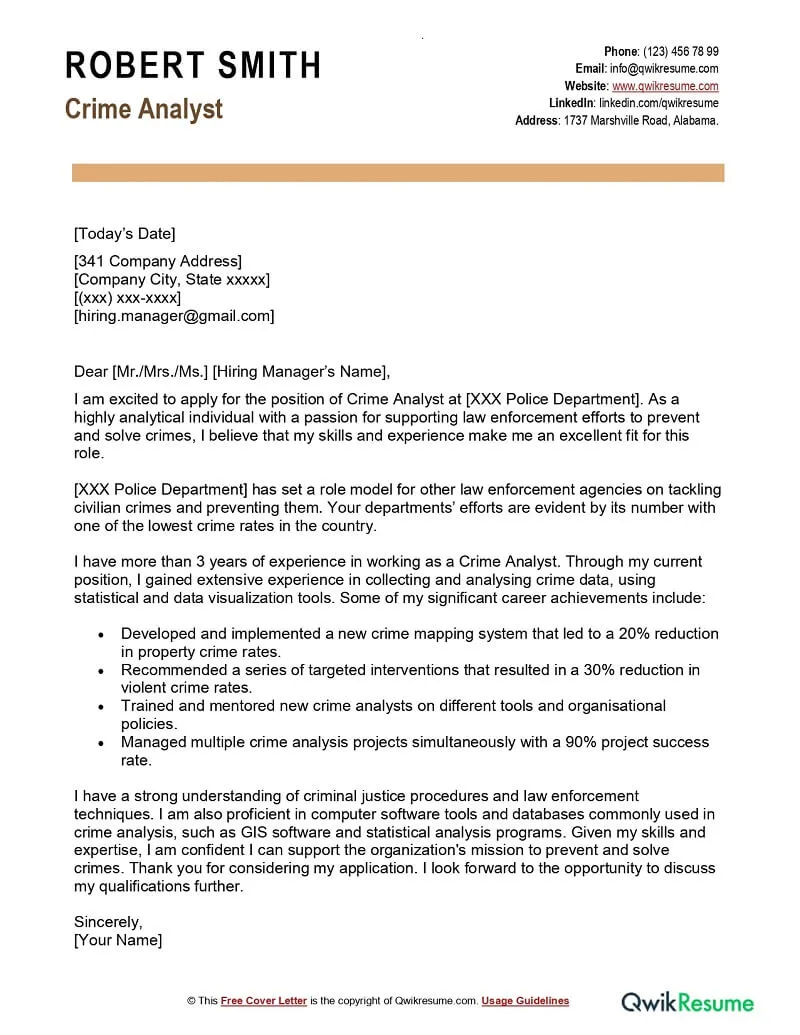Crafting a Criminal Justice Cover Letter
A well-crafted cover letter is your first opportunity to make a strong impression on potential employers in the competitive field of criminal justice. It serves as more than just an introduction; it’s your chance to showcase your relevant skills, experience, and passion for the field. A compelling cover letter can significantly increase your chances of landing an interview and ultimately securing your dream job. In this guide, we’ll explore the key elements of a successful cover letter, providing you with actionable tips and strategies to stand out from the crowd and demonstrate why you’re the perfect fit for the role.
Researching the Criminal Justice Field
Before you even begin writing, thorough research is crucial. Understand the specific organization and the role you’re applying for. Visit their website, read their mission statement, and review recent news articles. This shows you’re genuinely interested and have taken the initiative to learn about them. Knowing the organization’s values and priorities will help you tailor your letter to align with their specific needs. Demonstrate that you know what the organization stands for. Understanding the current challenges in the criminal justice system, such as those related to reform, technology, or community relations, can also give your application an edge. Reference any current events related to criminal justice, that is relevant to the job you are applying for.
Understanding the Specific Job Requirements
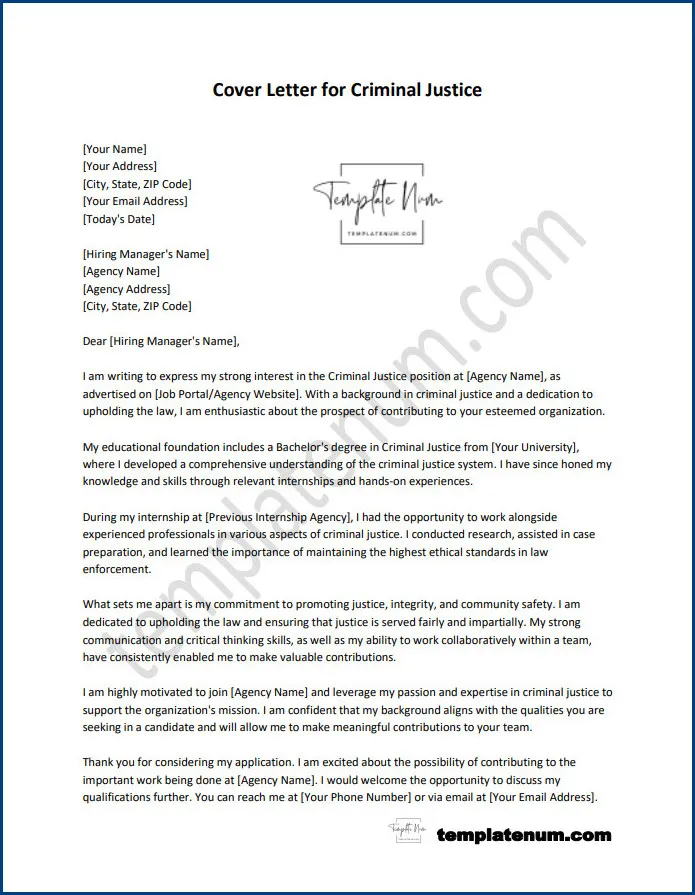
Carefully review the job description. Identify the key skills, qualifications, and experience the employer is seeking. Make a list of these requirements and use them as a checklist as you craft your cover letter. Identify how your skills and experience align with these requirements, and be specific. Instead of simply saying you possess good communication skills, provide examples of situations where you’ve demonstrated these skills. The more you demonstrate your qualifications for the specific job, the better. Also, use keywords from the job description throughout your cover letter. Recruiters often use automated systems to screen applications, and using relevant keywords ensures your application gets noticed.
Highlighting Relevant Skills and Experience
Your cover letter should highlight the skills and experience most relevant to the job. Think beyond your job titles and consider what you accomplished in each role. Did you improve efficiency, reduce costs, or solve a difficult problem? Quantify your achievements whenever possible. Instead of saying, “Managed a team,” say, “Managed a team of 10 officers, improving team performance by 15% within six months.” Focus on results and what you bring to the table. Use action verbs to describe your accomplishments, such as “led,” “managed,” “investigated,” or “analyzed.” Focus on the most important skills for the job and showcase how your past experiences have prepared you for success in the new role. Be sure to tailor this to each job. Show how the skills you have meet the requirements they’re asking for.
Showcasing Education and Certifications
Clearly state your educational background, including the name of your degree, the university or college you attended, and the year you graduated. If you have relevant certifications, such as those in crisis intervention or forensic science, be sure to list them. Mention any honors or awards you received. These details demonstrate your commitment to the field and your ability to meet the required qualifications. If your education includes relevant coursework, you may choose to highlight it. Also, if you have obtained any specialized training in the field, be sure to include it. If you’re currently pursuing a degree or certification, mention the expected completion date.
Quantifying Accomplishments
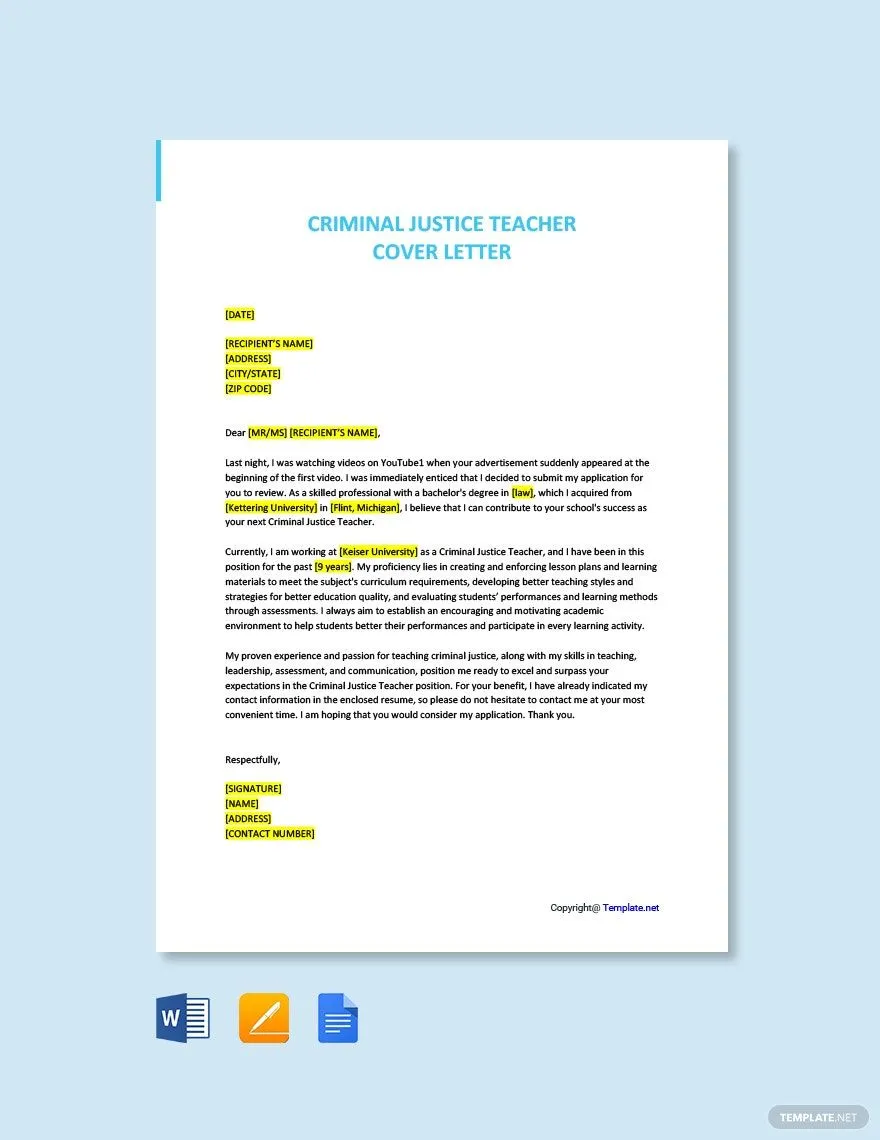
Whenever possible, quantify your accomplishments to provide concrete evidence of your capabilities. Numbers make your claims more believable and showcase your impact. For example, instead of saying you improved efficiency, state that you reduced processing time by 20%. Instead of saying you managed a team, state the size of the team and any specific achievements, such as successfully completing a project under budget or on time. Use metrics to demonstrate the value you brought to previous roles. Include statistics, percentages, and specific numbers to give your achievements more weight. Quantifiable results make your application more compelling.
Demonstrating Passion and Commitment
Your cover letter is your opportunity to demonstrate your genuine interest in the criminal justice field. Explain why you’re passionate about the work and how your values align with the organization’s mission. Express your enthusiasm for the specific role and the opportunity to contribute to the team. Showcase your dedication to upholding the law and ensuring public safety. Talk about the experiences that have driven you to pursue a career in criminal justice. This can include academic pursuits, volunteer work, or personal experiences. Make sure to tie your commitment to the specifics of the job and organization you are applying to.
Expressing Genuine Interest in the Role
Show that you’ve researched the organization and understand its values and goals. This demonstrates that you are serious about working there. Tailor your cover letter to the specific job and organization. Mention specific aspects of the role that excite you and explain why you’re a good fit. Do not simply send a generic cover letter to many employers. Expressing specific interest will set you apart from other candidates. Refer to particular projects or initiatives the organization is involved in, if you can. This shows you are paying attention and enthusiastic about the opportunity. Ensure your passion shines through by stating why you are interested in the role.
Tailoring the Letter to the Organization
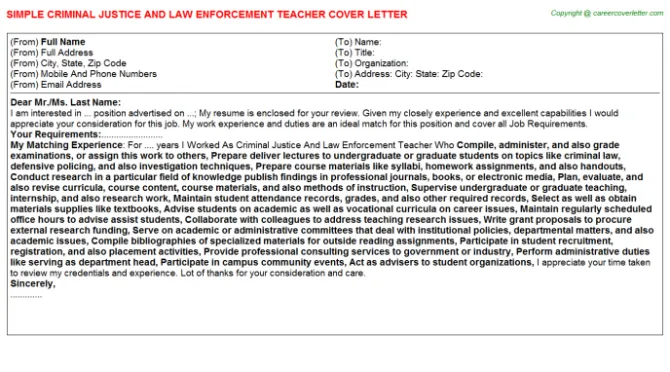
Customize your cover letter for each specific job and organization. Don’t send a generic template. Demonstrate you understand the organization’s mission and values. Reference the organization’s work in your letter. Show that you understand the role and what it entails. If the organization is involved in community outreach, for example, highlight your experience in similar activities. Tailoring your cover letter shows you’ve taken the time to research the organization and are truly interested in the opportunity. This makes your application stand out. Emphasize how your skills and experience align with the specific requirements and the organization’s needs. This also shows the employer that you pay close attention to detail and are committed.
Formatting and Proofreading Your Cover Letter
A well-formatted and error-free cover letter projects professionalism. Pay close attention to the layout, font, and overall appearance of your document. Ensure there are no grammatical errors or typos. Poor formatting and errors can create a negative impression, no matter how qualified you are. Take the time to proofread your work carefully. Make sure that your contact information is accurate and easy to find. Ensure your name, address, phone number, and email are clearly visible. Proofreading and formatting will ensure the reader gets the most out of your cover letter and increases the chances of your application getting accepted.
Formatting for Readability
Use a clear and easy-to-read font, such as Times New Roman, Arial, or Calibri. Keep the font size between 10 and 12 points. Use standard margins (1 inch on all sides) and single spacing. Break up long paragraphs into shorter ones to make the text more manageable. Use bullet points to highlight your skills and accomplishments. This makes your letter easier to scan and absorb. Use headings to organize the content logically and guide the reader. Ensure your letter has a professional appearance, avoiding excessive use of bolding or italics. Be sure to keep your cover letter concise. Aim for one page, if possible, unless the job posting specifically states otherwise.
Proofreading for Errors
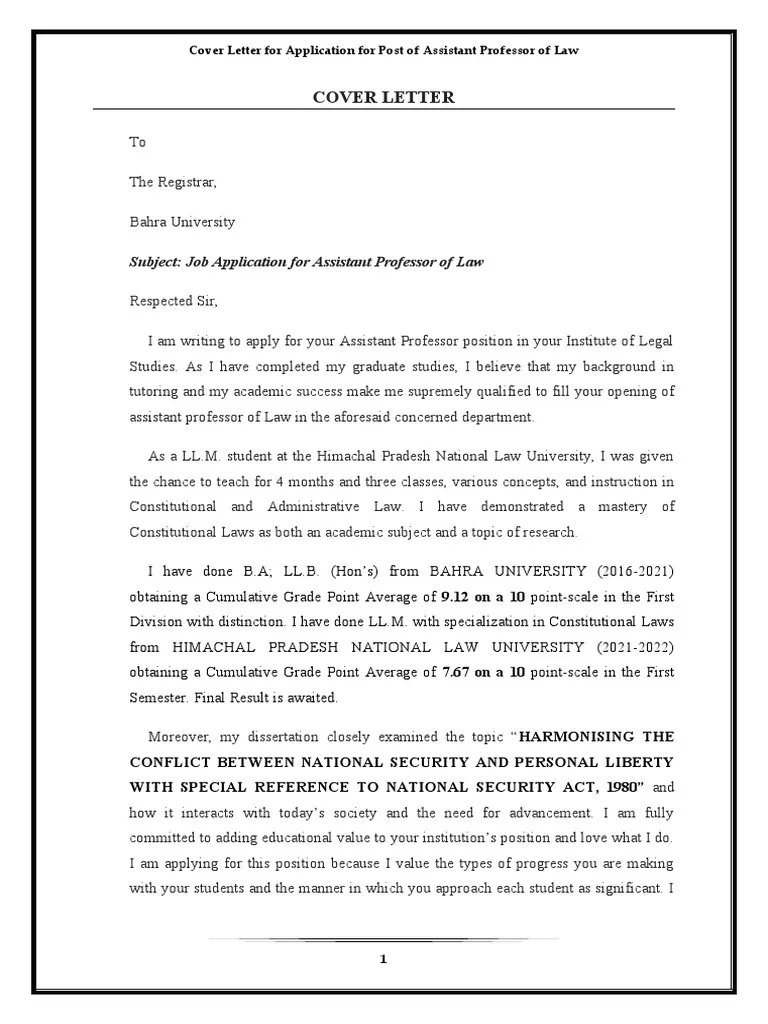
Proofread your cover letter multiple times. Check for spelling errors, grammatical mistakes, and punctuation errors. Use a grammar checker, but don’t rely on it entirely. Have a friend, family member, or career counselor review your letter for errors. A fresh set of eyes can catch mistakes you might miss. Verify that all the information is accurate. Check the names, titles, and dates. Pay close attention to the details, as errors can undermine your credibility. Make sure your cover letter is polished and professional before submitting it. Errors can create a negative impression and jeopardize your application.
By following these guidelines, you can craft a compelling cover letter that grabs the attention of hiring managers in the criminal justice field. Remember to tailor your letter to each specific job and showcase your unique qualifications. Good luck with your job search!
